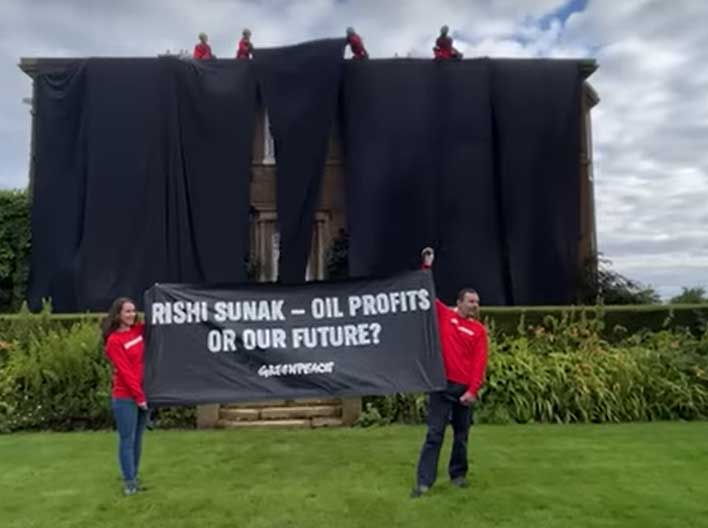Max Out Oil?
This week, following the surprise result of the Uxbridge by-election, PM Sunak flew by private jet to Scotland to announce the release of over a hundred new licences to drill for oil and gas. He seems to believe that there is political advantage to be gained from this new anti-green policy.
2023-08-04

big oil’s profits or our future on a habitable planet?
This week, following the surprise result of the Uxbridge by-election, PM Sunak flew by private jet to Scotland to announce the release of over a hundred new licences to drill for oil and gas. He seems to believe that there is political advantage to be gained from this new anti-green policy. Yet not all in his party agree – Conservatives like Alok Sharma, who led COP26 in Glasgow in November 2020, and Chris Skidmore, Climate Change minister in a previous administration who wrote a thorough report (since overlooked). Both would concur with the International Energy Agency that there can be no new oil, gas and coal developments if the world is to reach net zero by 2050.
We are not persuaded by the energy security argument in the announcement: “Sunak is even willing to peddle the old myth about new oil and gas helping ordinary people struggling with energy bills when he knows full well it’s not true. More North Sea drilling will only benefit oil giants who stand to make even more billions from it, partly thanks to a giant loophole in Sunak’s own windfall tax. ….It’s time for Sunak to choose between big oil’s profits or our future on a habitable planet.” [Greenpeace]
The public consistently identifies the government as the key player in leading the transition to net zero. Yet even before its recent shift in rhetoric, people did not think the government was stepping up to this role.
Achieving net zero emissions will require people making significant changes to the way they live. And this will not happen without the government playing a leading role. This includes bringing in policies which help people switch to low-carbon alternatives, having consistent messaging, leading by example (taking the train instead of flying by private jet for example), and working to build consensus on more contentious policy issues, such as car use and meat consumption.
People are divided over whether, and how, government should act to bring about such changes. Making progress in these areas in a way that is fair and acceptable to the majority can’t be rushed, it requires building consensus and bringing the public into the process of designing policies, and avoiding abrupt changes in strategy.
With measures to reduce car travel, support is contingent on there being affordable alternative transport options, or schemes that allow people to share cars for example. Designing and implementing these measures takes time and requires working with people. Rather than supporting such efforts, the current prime minister is intent on stoking division.
The government was already failing to live up to the leadership role people want to see it take and recent weeks will have confirmed this view. This is not easily undone. Leadership requires trust, and trust takes time to build. Unfortunately, time is in short supply. United Nations chief António Guterres declared that record heat and extreme weather signalled a new era of “global boiling” has arrived.
This article is brought to you by Bromsgrove Extinction Rebellion